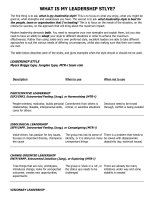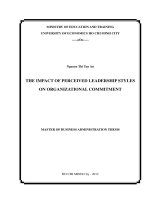Leadership styles Leadership styles Leadership styles Leadership styles Leadership styles Leadership styles
Bạn đang xem bản rút gọn của tài liệu. Xem và tải ngay bản đầy đủ của tài liệu tại đây (36.53 KB, 3 trang )
Leadership styles
The six styles of leadership
+ Coercive leadership: is a very direct form of leadership
built on instructing employees what to do and how to do it,
all while expecting strict compliance. It's an authoritarian
leadership style that leaves little room for error and demands
results.
Ex: A supervisor who threatens to demote, terminate, or
suspend an erring employee, for example, uses coercive power.
Unlike personal power, which individuals can wield over
themselves, people cannot use coercive power on themselves.
+ Authoritative leadership: Authoritative leaders focus on
guiding their team as a form of mentorship. They set out a
clear vision for what they want to accomplish and the
challenges they may have in front of them along the way, and
they have a plan for helping everyone get there.
Ex: such as Adolf Hiter, Benito Mussolini, and Kim Jong-un.
They used their authority to control those working under them,
and not accept any deviation from their vision.
+ Affiliative leadership: is an approach to management that
prioritizes emotional intelligence and strong emotional
bonds between managers and team members. Affiliative
leaders embrace the theory that high-performing teams enjoy
good communication and a sense of belonging.
Ex: A Globally Famous Is The Dalai Lama. His Teachings,
Compassion And Dedication Inspire His Followers And
Disciples To Follow Him On His Path Of Happiness And
Harmony, No Matter What The Conditions Are
+ Democratic leadership: is an open leadership style that
empowers group members in the decision-making process .
If you work in an industry that benefits from open discussion
and sharing of opinions, you may want to consider this
leadership style.
Ex: During WWII, Ike was appointed Supreme Allied
Commander. While that title might seem to imply unlimited
authority, he worked extremely hard to hold together a diverse
coalition.
+ Pacesetting leadership : is a leadership style where leaders
uphold high standards and expectations for their team. As
the name implies, the leader sets the pace for their team or
organization by putting forward an approach that can be
summarized as "Do as I do, now."
Ex: One of the most well-known examples of pacesetting
leadership is Jack Welch, the CEO of GE from 1981 to 2001.
He created a highly successful and equally intense work
environment at General Electric. As an example, he was one of
the pioneers of the practice of forced ranking, where he let go
of the bottom 10% of performers at the company and rewarded
the top 20% of performers annually.
+ Coaching leadership: is a style that involves recognizing team
members’ strengths, weaknesses and motivations to help each
individual improve.
Ex: Microsoft CEO, Satya Nadella. He inherited a stagnating
organization but managed to drive a turnaround by closely
engaging with his team. He developed the organization by
focusing on its constituents – the people that make Microsoft.
- Transactional leadership: is a leadership style where
leaders rely on rewards and punishments to achieve
optimal job performance from their subordinates.
- Transformational leadership :is defined as a leadership
approach that causes change in individuals and social
systems.









